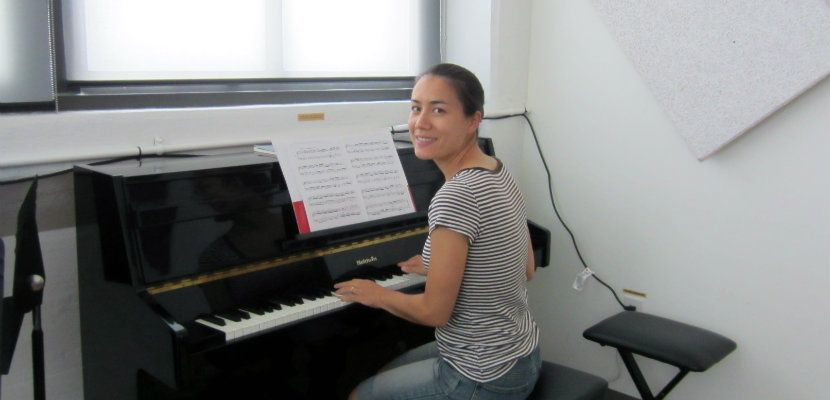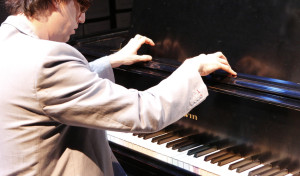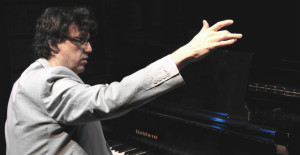I’ll admit: I’m not very good at listening to classical music, even at a live concert. The only pieces I can usually fully appreciate at a classical piano concert are ones that are both short and already familiar to me (it helps if I’ve studied them)—and all this only applies if I can see the pianist’s individual fingers moving. Otherwise, my mind wanders, I squirm in my seat like a child, and I guiltily hope it ends soon.
But when I had the chance to attend a Bargemusic concert on the Brooklyn waterfront this summer, I got excited. I have been so engrossed in classical piano music since returning to the piano last year that maybe, I thought, this one will be different. Stewart Goodyear would be playing eight Beethoven sonatas, a couple of which I had studied when I was younger, aboard a small boat docked on the East River. With such a small venue, I was able to choose seats in the fourth row, left side, for a clear view of the keyboard.
I decided to use my practice time—one hour a week at a rehearsal space—to prepare. I would try to sight-read or re-familiarize myself with all of the sonatas Goodyear was going to perform, so that I could follow along and pay attention.
In my practice room, I started out by playing some of the easier ones I had tried as a kid: Op. 49 No. 1 in G Minor and Op. 49 No. 2 in G Major. With their satisfying octaves and self-explanatory cadences, it was a fun experience, and I happily crunched those chords. But it all seemed too simple, too perfectly resolved—and this was my overall impression of Beethoven’s music, to be honest: so straight-up classical that it was predictable.
During my next practice hour, I tried sonatas that were a little more advanced, and my world opened up. Op. 31 No. 3 in E-flat Major provided more drama, was more challenging to play, and even had some “irrational” rhythms (like quintuplets next to quadruplets) that seemed to look ahead to the Romantic era. Likewise, Op. 31 No. 1 in G Major offered intrigue and long-running fioritura à la Chopin.
During my third and final session, Op. 53 (“Waldstein”) took me 45 minutes to play through, and I was impressed with its weirder qualities and unexpected triplets. Maybe there was much more to Beethoven, after all, than could be inferred from the scales, octaves, and repetition of his easier pieces.
My time was up and I had only made it though five (well, four and three-quarters) of the eight sonatas.
On the barge, the stage bobbed with the waves and the performer wore an untucked shirt: an informal summer recital. I was engaged in the music for the entire first half of the concert, even staying alert and interested during one of the sonatas that was completely unfamiliar to me. During the ones I did know, I hung on nearly every note.
During the second half, some of the sonatas were extremely long, and I decided that looking out the window, appreciating the summer waterfront scene around me, was also a productive use of time. By the last two sonatas, though—abstract works that I had never even heard a shred of before—my mind got so desperate I resorted to comparing people’s head shapes in the rows in front of me.
At the end of the concert, I felt a bit defeated. Had I gotten enough out of this whole thing?
After letting the experience seep in over a few weeks’ time, I finally realized that with something as complex as classical music, such ambitious goals—whether for listening or playing—aren’t always going to come together as planned. Instead, I can be proud of the subtle shifts and small amounts of progress I do make.





I don’t necessarily think “not paying attention” is much of a problem as you seem to make it out to be! I mean, for myself, I’m perfectly able to practice 4 hours straight on good day, yet still sometimes find my mind wandering when I’m at an hour-long concert! Indeed, my great love at the piano is for Beethoven, and though I love the seriousness and gravity of his sonatas, my attention sometimes wavers when I’m playing the most difficult of even those. I am fully aware that this isn’t “normal” behaviour, the realisation dawning particularly clearly when someone’s review of another’s performance of the Waldstein spoke of his “laser beams of concentration that seemed to burn holes through the keyboard as he played every bar”….or something! I was very surprised when I read this, my first reaction being: what ever happened to just ENJOYING the music!!?
I have to confess, though, your approach for watching concerts sounds excessively analytical to me. I only ever analyse fingering and technique when I’m ACTIVELY trying to learn something, preferring instead to just listen to the interpretation, to enjoy the experience. Youtube has loads of videos showcasing reasonably solid renditions of the pieces I want to learn that I can peruse, fast-forward, replay, at my own time. The experience of a live concert, however, is one that will never be replicated, and communicates feelings about the piece and music that you won’t ever get elsewhere.
Another thing. Try not to always see your inability to concentrate on the performance as a FAULT on your part, eg as a reflection of your poor attention span or whatnot. Rather, might it be possible that you’re switching off because your mind intuitively recognises the music as uninteresting? It may be sacrilege to speak of Beethoven sonatas in that way, but do remember: just because it is by a renowned composer, just because it is being performed by a “professional”: these do not automatically mean the performance will be of value. As a performer, my honest opinion is that if the audience is uninterested, then it is MY fault for not making the music interesting. And if as a listener I am uninterested, then it could be worth thinking about WHY this is so, and perhaps, thinking about how YOU could make it even more interesting yourself!
The bottom line, enjoy the music, and trust that your own musicality would help you find if there is anything to enjoy! Classical music is music at the end of the day: made to be enjoyed first; analysed second!
Marcus, thanks for your comment. Great points! I guess the reason I was so bothered is that I love to play classical music, and I love to listen to other types of live music, so why was I often bored when listening to live classical music?
Joanna, maybe you are being too hard on yourself. Rather than blame yourself for either not knowing the pieces that are being played; or a drifting attention span, perhaps the bouquet should be laid at the feet of the performer. Isn’t it the performer whose role it is to communicate to the listener? And when that connection is missing, it’s very common for the audience to become bored, distracted or disinterested. If the performer is engaging the listeners, it’s a whole different ballgame. Applaud your effort, though.
Katherine, I think perhaps she was a bit hard on herself. I very much enjoyed your blog. What beautiful and engaging writing. I will share on our social media.
Katherine, thanks for reading and for your thoughtful comment. I think listening closely is difficult for most people. I am always looking for some kind of project or challenge when it comes to the piano; otherwise I’m just aimlessly repeating old tunes.